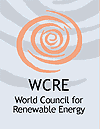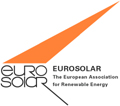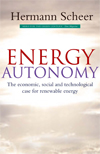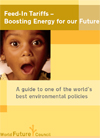Memoranda & Papers
 WCRE paper, June 10th, 2001
WCRE paper, June 10th, 2001
Foundation Document of the World Council for Renewable Energy
Considering the fact that the global energy demand is increasing faster than the introduction of Renewable
Energy; the emergency (because of their comprehensive impacts, climate hazards, burdens to the environment, risks of accidents, conflicts around exhausting resources) to replace nuclear and fossil energy by renewable ones and focus new investments on Renewable Energy and energy efficiency; the big differences in energy system requirements between nuclear and fossil energy on the one hand and Renewable Energy on the other, requiring different sources, techniques, infrastructures, investors, forms of business organization, as well as different economic calculations and political framework conditions...
 EUROSOLAR memorandum, May, 2001
EUROSOLAR memorandum, May, 2001 For the Establishment of an International Renewable Energy Agency (IRENA)
The global climate changes, the impending exhaustion of fossil energy sources, the dangers of nuclear based security as well as the proliferation of atomic weapons will result in our relying globally on Renewable Energy. This maxim applies for all countries throughout the world, for developing countries as well as industrial ones. Time is pressing; the introduction of Renewable Energy is not keeping up with increasing energy consumption.
 Establishment of an International Renewable Energy Agency (IRENA) (pdf)
Establishment of an International Renewable Energy Agency (IRENA) (pdf)
 Document drawn up by Thomas Herzog, March, 1996
Document drawn up by Thomas Herzog, March, 1996
Roughly half of the energy consumed in Europe is used to run buildings. A further 25 % is accounted for by traffic. Large quantities of non-renewable fossil fuel are used to generate this energy, fuel that will not be available to future generations. The processes involved in the conversion of fuel into energy also have a lasting negative effect on the environment through the emissions they cause. In addition to this, unscrupulous, intensive cultivation, a destructive exploitation of raw materials, and a worldwide reduction in the areas of land devoted to agriculture are leading to a progressive diminution of natural habitats.
 European Charter for Solar Energy in Architecture and Urban Planning (pdf)
European Charter for Solar Energy in Architecture and Urban Planning (pdf)



